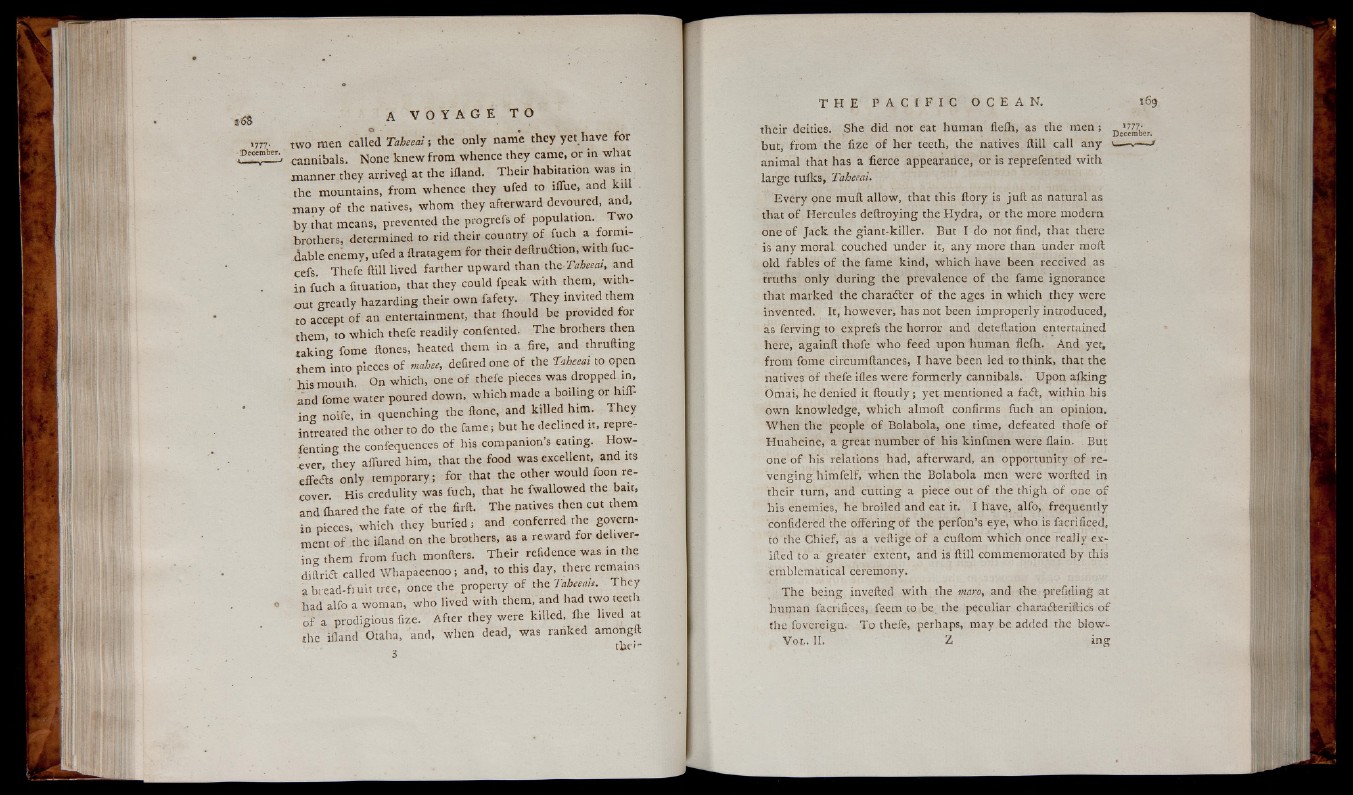
>777• tw o men called Taheeai; the only name they yet. have for
cannibals_ None k n ew from whence they came, or in what
manner they arrive^ at the ifland. T h e ir habitation was m
the mountains, from whence they ufed to lflue, and k ill .
m an y o f the natives, whom they afterward devoured, and,
b y that means, prevented the progrefs o f population. Tw o
brothers, determined to rid their country o f fuch a formidable
enemy, ufed a ftratagem for their deftruction, w ith fuc-
cefs. Thefe ftill lived farther upward than the-Taheeai, and
in fuch a fituation, that they could fpeak with them, w ith o
u t greatly hazarding their own fafety. T h e y invited them
to accept o f an entertainment, that Ihould be provided for
them, to w h ich thefe readily confented. T h e brothers then
ra k in g fome ftones, heated them in a fire, and thrufting
them into pieces o f mahee, defired one o f the Taheeai to open
his m outh. On which, one o f thefe pieces was dropped in,
and fome water poured down, which made a boiling or hilf-
in g noife, in quenching the ftone, and killed him. T h e y
infreated the other to do the fame •, but he declined it, repre-
fenting the confequences o f his companion’s eating. Howe
ve r they allured him, that the food was excellent, and its
effefts only temporary; for that the other would foon recover
His credulity was fuch, that he fwallowed the bait,
and {hared the fate o f the firft. T he natives then cut them
in pieces, w hich they buried; and conferred the government
o f .the ifland on the brothers, as a reward for delivering
them from fuch monfters. T h e ir refidence was in the
diftrift called Whapaeenoo ; and, to this day, there remains
a b r e a d - f r u i t tree, once the property o f the Taheeai*. T h e y
° bad alfo a woman, who lived with them, and had two teet 1
o f a prodigious fize. After they were killed, ihe lived at
the ifland Otaha, and, when dead, was ranked amohgft
their deities. She did not eat human flelh, as the m e n ; De'c^ ei.
but, from the fize o f her teeth, the natives ftill ca ll any < .— >
animal that has a fierce appearance, or is reprefented with
large tuiks, Taheeai.
Eve ry one muft allow, that this ftory is ju ft as natural as
that o f Hercules deftroying the Hydra, or the more modern
one o f Jack the giant-killer. But I do not find, that there
is any moral couched under it, any more than under moll
old fables o f the fame kind, w h ich have been received as
truths only during the prevalence o f the fame ignorance
that marked the character o f the ages in w h ich they were
invented. It, however, has not been improperly introduced,
as ferving to exprefs the horror and deteftation entertained
here, againft thofe w ho feed upon human flelh. And yet,
from fome circumftances, I have been led to think, that the
natives o f thefe illes were formerly cannibals. Upon afk ing
Omai, he denied it fto u tly ; y e t mentioned a fadt, within his
own knowledge, which almoft confirms fuch an opinion.
When the people o f Bolabola, one time, defeated thofe o f
Huaheine, a great number o f his kin fmen were flain. But
one o f his relations had, afterward, an opportunity o f rev
en g in g himfelf, when the Bolabola men were worfted in
their turn, and cutting a piece out o f the thigh o f one o f
his enemies, he broiled and eat it. I have, alfo, frequently
confidered the offering o f the perfon’s eye, w ho is facrificed,
to the Chief, as a veftige o f a cuftom which once really ex-
ifted to a greater extent, and is ftill commemorated by this
emblematical ceremony.
The be in g invefted w ith the maro, and the prefiding at
human facrifices, feem to be the pecu lia r charatffceriftics o f
the fovereign. To thefe, perhaps, may be added the blow-
V ol. II. Z in g